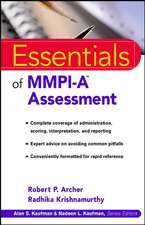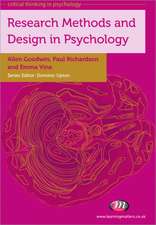The SAGE Handbook of Quantitative Methods in Psychology
Editat de Roger E Millsap, Alberto Maydeu-Olivaresen Limba Engleză Hardback – 22 iul 2009
Quantitative psychology is arguably one of the oldest disciplines within the field of psychology and nearly all psychologists are exposed to quantitative psychology in some form. While textbooks in statistics, research methods and psychological measurement exist, none offer a unified treatment of quantitative psychology. The SAGE Handbook of Quantitative Methods in Psychology does just that.
Each chapter covers a methodological topic with equal attention paid to established theory and the challenges facing methodologists as they address new research questions using that particular methodology. The reader will come away from each chapter with a greater understanding of the methodology being addressed as well as an understanding of the directions for future developments within that methodological area.
Drawing on a global scholarship, the Handbook is divided into seven parts:
Part One: Design and Inference: addresses issues in the inference of causal relations from experimental and non-experimental research, along with the design of true experiments and quasi-experiments, and the problem of missing data due to various influences such as attrition or non-compliance.
Part Two: Measurement Theory: begins with a chapter on classical test theory, followed by the common factor analysis model as a model for psychological measurement. The models for continuous latent variables in item-response theory are covered next, followed by a chapter on discrete latent variable models as represented in latent class analysis.
Part Three: Scaling Methods: covers metric and non-metric scaling methods as developed in multidimensional scaling, followed by consideration of the scaling of discrete measures as found in dual scaling and correspondence analysis. Models for preference data such as those found in random utility theory are covered next.
Part Four: Data Analysis: includes chapters on regression models, categorical data analysis, multilevel or hierarchical models, resampling methods, robust data analysis, meta-analysis, Bayesian data analysis, and cluster analysis.
Part Five: Structural Equation Models: addresses topics in general structural equation modeling, nonlinear structural equation models, mixture models, and multilevel structural equation models.
Part Six: Longitudinal Models: covers the analysis of longitudinal data via mixed modeling, time series analysis and event history analysis.
Part Seven: Specialized Models: covers specific topics including the analysis of neuro-imaging data and functional data-analysis.
Preț: 1141.23 lei
Preț vechi: 1327.02 lei
-14% Nou
Puncte Express: 1712
Preț estimativ în valută:
218.38€ • 228.47$ • 181.40£
218.38€ • 228.47$ • 181.40£
Carte tipărită la comandă
Livrare economică 03-17 aprilie
Preluare comenzi: 021 569.72.76
Specificații
ISBN-13: 9781412930918
ISBN-10: 141293091X
Pagini: 800
Dimensiuni: 184 x 246 x 48 mm
Greutate: 1.59 kg
Ediția:1
Editura: SAGE Publications
Colecția Sage Publications Ltd
Locul publicării:London, United Kingdom
ISBN-10: 141293091X
Pagini: 800
Dimensiuni: 184 x 246 x 48 mm
Greutate: 1.59 kg
Ediția:1
Editura: SAGE Publications
Colecția Sage Publications Ltd
Locul publicării:London, United Kingdom
Cuprins
PART ONE: DESIGN AND INFERENCE
Causal Inference in Randomized and Non-randomized Studies - Michael Sobel
The Definition, Identification and Estimation of Causal Parameters
Experimental Design - Roger Kirk
Quasi-Experimental Design - Charles Reichardt
Missing Data - Paul Allison
PART TWO: MEASUREMENT THEORY
Classical Test Theory - James Algina and Randall D Penfield
Factor Analysis - Robert C MacCallum
Item Response Theory - David Thissen and Lynne Steinberg
Special Topics in Item Response Theory - Michael Edwards and Maria Orlando Edelen
Latent Class Analysis - David Rindskopf
PART THREE: SCALING
Multidimensional Scaling - Yoshio Takane et al
Correspondence Analysis, Multiple Correspondence Analysis and Recent Developments - Heungsun Hwang et al
Modeling Preference Data - Albert Maydeu-Olivares and Ulf B[um]ockenholt
PART FOUR: DATA ANALYSIS
Applications of Multiple Regression in Psychological Research - Razia Azen and David Budescu
Categorical Data Analysis with a Psychometric Twist - Carolyn Anderson
Multilevel Analysis - Jee-Seon Kim
An Overview and Some Contemporary Issues
Resampling Methods - William H Beasley and Joseph L Rodgers
Robust Data Analysis - Rand R Wilcox
Meta-Analysis - Andy Field
Bayesian Data Analysis - Herbert Hoijtink
Cluster Analysis - Lawrence Hubert et al
A Toolbox for MATLAB
PART FIVE: STRUCTURAL EQUATION MODELS
General SEM - Robert Cudeck
Maximum Likelihood And Bayesian Estimation For Nonlinear Structural Equation Models - Melanie Wall
Structural Equation Mixture Modeling - Conor Dolan
Multilevel Latent Variable Modeling - David Kaplan et al
Current Research and Recent Developments
PART SIX: LONGITUDINAL MODELS
Modeling Individual Change over Time - Suzanne Graham, Judy Singer and John Willett
Time Series Models for Examining Psychological Processes - Emilio Ferrer and Guangjian Zhang
Applications and New Developments
Event History Analysis - Jeroen Vermunt
PART SEVEN: SPECIALIZED METHODS
Neuroimaging Analysis (I) - Josep Marco-Pallarés et al
Electroencephalography
Neuroimaging Analysis (II) - Estela Camara et al
Magnetic Resonance Imaging
Functional Data Analysis - James O Ramsay
Causal Inference in Randomized and Non-randomized Studies - Michael Sobel
The Definition, Identification and Estimation of Causal Parameters
Experimental Design - Roger Kirk
Quasi-Experimental Design - Charles Reichardt
Missing Data - Paul Allison
PART TWO: MEASUREMENT THEORY
Classical Test Theory - James Algina and Randall D Penfield
Factor Analysis - Robert C MacCallum
Item Response Theory - David Thissen and Lynne Steinberg
Special Topics in Item Response Theory - Michael Edwards and Maria Orlando Edelen
Latent Class Analysis - David Rindskopf
PART THREE: SCALING
Multidimensional Scaling - Yoshio Takane et al
Correspondence Analysis, Multiple Correspondence Analysis and Recent Developments - Heungsun Hwang et al
Modeling Preference Data - Albert Maydeu-Olivares and Ulf B[um]ockenholt
PART FOUR: DATA ANALYSIS
Applications of Multiple Regression in Psychological Research - Razia Azen and David Budescu
Categorical Data Analysis with a Psychometric Twist - Carolyn Anderson
Multilevel Analysis - Jee-Seon Kim
An Overview and Some Contemporary Issues
Resampling Methods - William H Beasley and Joseph L Rodgers
Robust Data Analysis - Rand R Wilcox
Meta-Analysis - Andy Field
Bayesian Data Analysis - Herbert Hoijtink
Cluster Analysis - Lawrence Hubert et al
A Toolbox for MATLAB
PART FIVE: STRUCTURAL EQUATION MODELS
General SEM - Robert Cudeck
Maximum Likelihood And Bayesian Estimation For Nonlinear Structural Equation Models - Melanie Wall
Structural Equation Mixture Modeling - Conor Dolan
Multilevel Latent Variable Modeling - David Kaplan et al
Current Research and Recent Developments
PART SIX: LONGITUDINAL MODELS
Modeling Individual Change over Time - Suzanne Graham, Judy Singer and John Willett
Time Series Models for Examining Psychological Processes - Emilio Ferrer and Guangjian Zhang
Applications and New Developments
Event History Analysis - Jeroen Vermunt
PART SEVEN: SPECIALIZED METHODS
Neuroimaging Analysis (I) - Josep Marco-Pallarés et al
Electroencephalography
Neuroimaging Analysis (II) - Estela Camara et al
Magnetic Resonance Imaging
Functional Data Analysis - James O Ramsay
Descriere
Every reader will come away with a greater understanding of the methodology being addressed as well as an understanding of the directions for future developments within each methodological area.

















